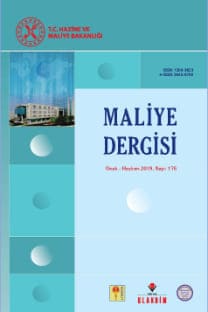Türkiye’de kamu hizmetinin görülmesinde kullanılmakta olan gizlilik derecesi tanımları: Uygulamadaki sorunlar ve çözüm önerileri
Security classification definitions used in the delivery of public service in Turkey: Implementation problems and solution proposals
___
Australian Government (19 July 2011), “Information Security Management Guidelines, Australian Government Security Classification System, Version 1.0”, http://www.ag.gov.au/Documents/Australian%20Government %20information%20security%20management%20guidelines%20Australian%20 Government%20Security%20classification%20system.pdf (Erişim Tarihi: 20/1/2012)Cabinet Office (October 2011), “HMG Security Policy Framework- Version 7”, http://www.cabinetoffice.gov.uk/sites/default/files/resources/HMG-Security- Policy-Framework-v7-Oct11.pdf (Erişim Tarihi: 2/1/2012)
Council of the European Union, Official Journal of the European Union (27/5/2011), “Council Decision of 31 March 2011 on the Security Rules for Protecting EU Classified Information (2011/292/EU)”, http://eurlex.europa.eu/LexUriServ/Lex UriServ.do?uri=OJ:L:2011:141:0017:0065:EN:PDF (Erişim Tarihi: 7/2/2012)
Department of Homeland (1/6/2005), “Security Management Directive System, MD Number: 11042.1”,http://www.dhs.gov/xlibrary/assets/foia/mgmt_directive_ 110421_safeguarding_sensitive_but_unclassified_information.pdf (Erişim Tarihi: 14/2/2012)
European Commission, Official Journal of the European Union (3/12/2001), “Commission Decision of 29 November 2001, Amending Its Internal Rules of Procedure (notified under document number C(2001) 3031), 2001/844/EC, ECSC, Euratom”, http://eurlex.europa.eu/LexUriServ/LexUriServ.do?uri=OJ:L: 2001:317:0001:0055:EN:PDF (Erişim Tarihi: 26/2/2011)
Kerr, P.K., Analyst in Nonproliferation, Nikitin, Mary Beth, Analyst in Nonproliferation (January 11, 2011), “Nuclear Cooperation with Other Countries: A Primer”, http://fpc.state.gov/documents/organization/155617.pdf (Erişim Tarihi: 14/2/2012)
Kosar, K.R. (December 10, 2010), Analyst in American National Government, Congressional Research Service, “Classified Information Policy and Executive Order 13526”, http://www.fas.org/sgp/crs/secrecy/R41528.pdf (Erişim Tarihi: 26/3/2011)
National Archives and Records Administration, Information Security Oversight Office (April 15, 2011 [a]), “2010 Report to the President”, http://www.archives.gov/isoo/reports/2010-annual-report.pdf (Erişim Tarihi: 21/12/2011)
National Archives and Records Administration, Information Security Oversight Office (April 29, 2011 [b]), “2010 Cost Report”, http://www.archives.gov/isoo/ reports/2010-cost-report.pdf (Erişim Tarihi: 21/12/2011)
National Archives and Records Administration, Information Security Oversight Office (Revision 1, January 2012), “Marking Classified National Security Information”, http://www.archives.gov/isoo/training/marking-booklet.pdf (Erişim Tarihi: 8/2/2012)
North Atlantic Council (17/06/2002 [a]), “Security within the North Atlantic Treaty Organization (NATO), C-M(2002)49, Enclosure A-Annex 1,” http://www.statewatch.org/news/2006/sep/nato-sec-classifications.pdf (Erişim Tarihi: 4/4/2011)
North Atlantic Council (11/07/2002 [b]), “The Management of Non-Classified NATO Information, C-M(2002)60, Annex 1”, http://www.juridischadviesbureaumaury.nl/natomandoc.pdf (Erişim Tarihi: 9/2/2012)
North Atlantic Council (4/02/2005), “Directive on the Security of Information, Document AC/35-D/2002-REV2, Annex 1”, http://www.nbf.hu/anyagok/ jogszabaly/AC_35-D_2002-REV2.pdf (Erişim Tarihi: 4/4/2011) North Atlantic Council (9/04/2010), “Security within the North Atlantic Treaty Organization, Corrigendum to C-M(2002)49 dated 17 June 2002 Amendment 8, Enclosure B, Enclosure E”, http://www.nbu.cz/download/nodeid-865 (Erişim Tarihi: 10/2/2012)
Reducing Over-Classification Act (October 9, 2010), Public Law 111-258 http://www.gpo.gov/fdsys/pkg/PLAW-111publ258/pdf/PLAW-111publ258.pdf (Erişim Tarihi: 5/4/2011)
The Economist, “Democracy Index 2010, Democracy in Retreat, A Report from the Economist Intelligence Unit”, https://www.eiu.com/public/topical_report.aspx? campaignid=demo2010 (Erişim Tarihi: 5/1/2011)
The Economist, “Democracy Index 2011, Democracy Under Stress, A Report from the Economist Intelligence Unit”, http://www.eiu.com/public/topical_ report.aspx?campaignid=DemocracyIndex2011 (Erişim Tarihi: 2/1/2012)
The White House, Federal Register (January 5, 2010), “Executive Order 13526 of December 29, 2009, 75(2)”, http://edocket.access.gpo.gov/2010/pdf/E9- 31418.pdf (Erişim Tarihi: 4/4/2011)
The White House, Federal Register (October 13, 2011), “Executive Order 13587 of October 7, 2011, Structural Reforms to Improve the Security of Classified Networks and the Responsible Sharing and Safeguarding of Classified Information, Vol.76, No.198”, http://www.archives.gov/isoo/policydocuments/ eo-13587.pdf (Erişim Tarihi: 21/12/2011)
TÜBİTAK, Bilişim ve Bilgi Güvenliği İleri Teknolojiler Araştırma Merkezi (1 Aralık 2011), “Elektronik Belgeleri Açık Anahtar Altyapısı Kullanarak Güvenli İşleme Rehberi” http://www.kamusm.gov.tr/dosyalar/rehberler/guvenli_ belge_rehberi.pdf (Erişim Tarihi: 29/12/2011)
- ISSN: 1300-3623
- Yayın Aralığı: Yılda 2 Sayı
- Başlangıç: 1973
- Yayıncı: Hazine ve Maliye Bakanlığı
2001 Güçlü ekonomiye geçiş programı ve istihdam üzerine etkileri
Emine Nida KOL, Zeynep KARAÇOR
Bir usul ekonomisi kolaylığı: Vergi yargısında tek dilekçe ile dava açma
Arzu BALIBEK AYTEKİN, Zeliha ÖNAL, Halil AZAL
2001 ve 2008 yılında oluşan krizlerin faktör analizi ile açıklanması
Tıkanıklık fiyatlaması, Dünya uygulamaları ve Türkiye’deki durumun değerlendirilmesi
Ücretlerin vergilendirilmesine ilişkin karşılaştırmalı bir öneri: Beyanname yükümlülüğü
Türkiye’de deniz taşımacılığına sağlanan vergi teşvikleri üzerine bir inceleme
